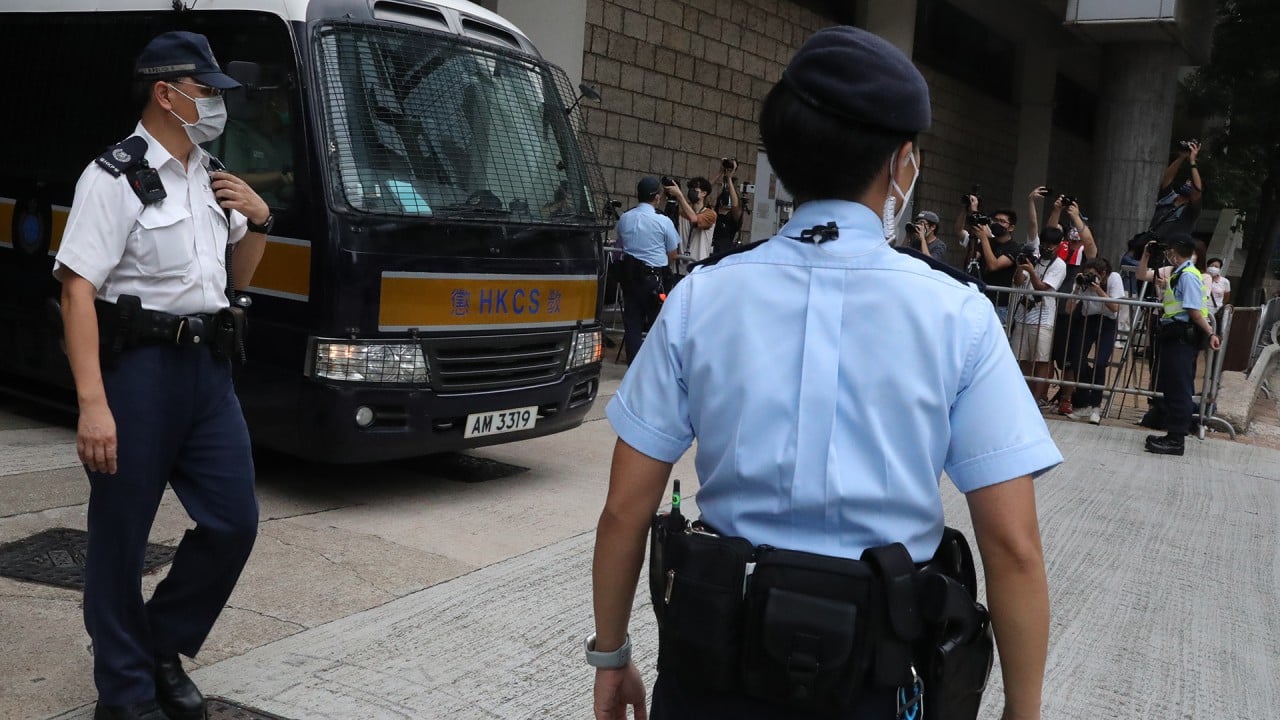
US offers temporary ‘safe haven’ for Hongkongers in response to crackdown on opposition
- Hong Kong residents already in the US will be granted the right to stay and work for 18 months, and restrictions on student visa holders may also be suspended
- White House press secretary Jen Psaki says the decision shows Joe Biden’s support for the city’s people ‘in the face of ongoing repression’
“We, alongside our allies and partners, strongly oppose the PRC’s wielding of the national security law to deny basic rights and freedoms, assault Hong Kong’s autonomy and undermine its remaining democratic processes and institutions.
Biden’s order authorises the Department of Homeland Security to give Hong Kong residents 18-month “safe haven status”, allowing them to work in the US, and to “consider suspending” restrictions on Hongkongers holding F-1 student visas.

03:44
US offers temporary ‘safe haven’ for Hongkongers in response to crackdown on opposition
Dozens of opposition figures have been arrested and charged in the wake of the 2019 anti-government protests.
Tong was found guilty of terrorism and incitement to commit secession over his actions on July 1, 2020 – hours after the law took effect.
US sanctions on China to continue but Beijing ‘unlikely to escalate’
Both the Biden administration and Congress are under pressure from advocates to offer protections to Hongkongers either fleeing the city or already in the US.

02:10
Man found guilty in Hong Kong’s first national security law trial
Asked on Thursday why the administration had acted now rather than earlier, State Department spokesman Ned Price suggested it was the result of cumulative actions by the central and Hong Kong governments to erode civil liberties in the city.
“The ‘why now’ question is all around us,” Price said. “And virtually every week we have spoken of additional crackdowns, of additional incidents of repression, of continuing efforts by the part of PRC and Hong Kong authorities to assault the fundamental rights, freedoms and, again, the guarantees that … the people of Hong Kong were promised.”
Biden nominates Huawei prosecutor for key China export post
Biden’s safe haven measures were originally slated to be rolled out in July, alongside economic sanctions the White House imposed on Chinese officials based in Hong Kong, according to a source familiar with the matter. But the protections were held up at the Department of Homeland Security because of “bureaucratic checks that needed to be done,” said the source, who spoke on condition of anonymity. The hold-up was not “political”, the person said.
Alongside the sanctions, the Biden administration also issued a joint advisory warning American businesses about risks to their operations and activities in Hong Kong. It reminded them that they were subject to the territory’s laws, including the national security law, under which foreign nationals, including one US citizen, have been arrested.
The US Treasury Department simultaneously sanctioned seven Chinese officials from the city’s liaison office, adding to the list of dozens of Hong Kong and mainland Chinese officials already sanctioned by Washington.
The US joins Britain and Canada in offering special immigration measures designed to accommodate Hongkongers who have left home in response to Beijing’s increasingly strict policies.

Britain announced a new British National (Overseas) visa programme immediately after Beijing imposed the national security law. It allows all Hong Kong residents with BN(O) status and their immediate family members to apply for a new category of visa that will allow them to live and work in Britain and, after six years, apply for citizenship.
The Canadian government issued new visa rules in November that allow any Hong Kong resident who has graduated from a Canadian university in the past five years, or those with equivalent foreign credentials, to apply to work in the country for up to three years.
Joe Biden warns of cyberattack resulting in ‘real shooting war’
Biden’s move on Thursday expands measures announced by the administration of his predecessor Donald Trump, when the State Department for the first time included Hong Kong in its annual refugee admissions proposal.
However, additional steps need to be taken to make Biden’s order more meaningful, and that will require congressional action, said Stephen Yale-Loehr, an immigration law professor at Cornell University.
The order amounts to deferred enforced departure, which differs from temporary protected status (TPS), a more open-ended designation that can only be granted by Congress.

06:15
BN(O) passport holders flee Hong Kong for new life in the UK, fearing Beijing’s tightening control
In 1989, president George Bush granted Chinese students temporary safe haven after Beijing’s bloody crackdown on pro-democracy demonstrators, and Congress followed up by passing a law in 1992 to allow Chinese students in the US at the time of the Tiananmen Square violence to apply for permanent residence.
“If the human rights situation in Hong Kong worsens, Congress may need to do that here as well,” Yale-Loehr said.
The Malinowski-Kinzinger bill would also designate Hong Kong as a foreign state apart from mainland China for the purposes of immigration for five years.


